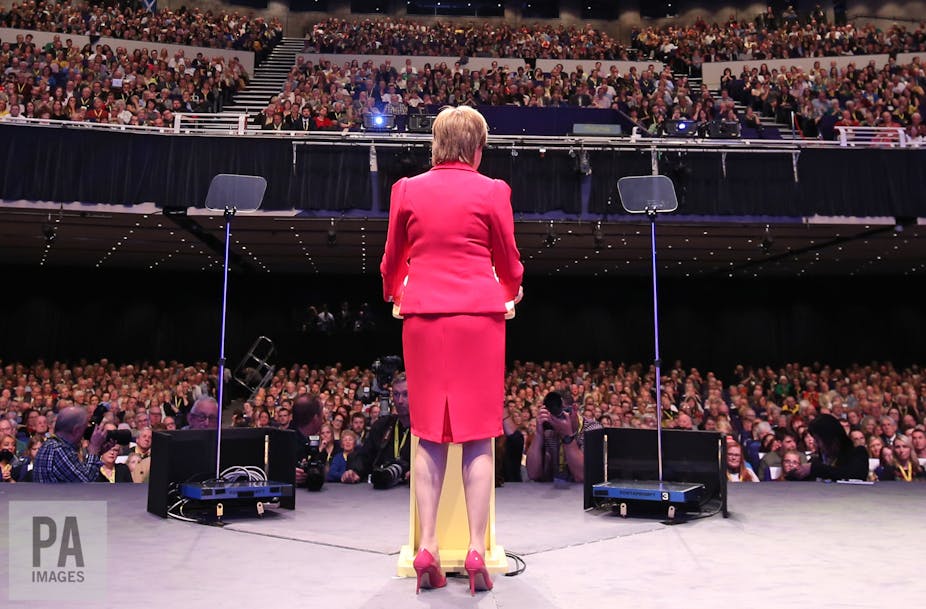Just over two years after Scotland’s once-in-a-generation referendum, a colourful crowd with indyref2 flags and banners gathered at the entrance to the SECC in Glasgow ahead of Nicola Sturgeon’s keynote speech at the SNP conference. After the first minister had opened the event on Thursday with rhetoric about a new independence bill, their mood was buoyant.
Inside the hall, the immediate build up involved two set pieces that anticipated Sturgeon’s speech. We saw a very emotional appearance on stage by members of the Chhokar family thanking the party for its support in pursuing justice over the murder of waiter Surjit Singh Chhokar, whose killer has just been convicted in a retrial 18 years after the event. Then came a debate condemning HMRC and its mistreatment of tax credit victims – an opportunity to attack the Conservatives for their uncaring approach to ordinary people.
When the first minister took to the stage, her speech was all about contrasting a progressive, communitarian and inclusive SNP-led majority in Scotland with a hard-right, xenophobic, inward-looking Conservative government shaming itself by increasingly resembling UKIP. At one point she memorably labelled them the “Conservative and separatist party” for their hard Brexit stance.
Here was Sturgeon the confident progressive European in total control of her party. She said the Brexit result had taken away part of her identity and empathised with how no voters in 2014 would have felt if the independence referendum had gone the other way. She even joked about the party’s primary goal of independence, telling delegates if they remembered just one word from her speech “it begins with an ‘i’”. “No not that one … not yet,” she teased – the “i” she had in mind was inclusion.
Not one strategy but two
The news headlines emphasised Sturgeon’s plan for a second referendum in the event of a hard Brexit, but it felt like the first minister is developing two possible plans depending on the Brexit negotiation outcome. She received sustained cheers for announcing permanent trade representatives in Berlin, towards developing stronger EU relationships that might help Scotland stay in the single market whether or not it leaves the UK.
She spoke more than once about “Scotland’s home rule journey”, unashamedly stealing this mantle from Labour and the Lib Dems while avoiding talking about the likes of Kezia Dugdale or Jeremy Corbyn. Here was Sturgeon effectively rewriting the march to home rule as an SNP gradualist success story.
Indeed, the Labour party was dismissed as a joke. “What of Labour?” she said to laughter from the audience, dismissing Scotland’s former dominant party as a branch office lacking ambition. Sturgeon didn’t mention the Conseratives’ Ruth Davidson either, though she did cover the right flank by announcing a policy on child vouchers to offer “choice to parents”. The SNP is the only effective opposition to the Conservative government, was a recurring theme.
Sturgeon was also confident enough to concentrate on issues which were not designed as crowd pleasers but allowed her to put her own stamp on her party and her administration, such as Aleppo and Syrian refugees. She sounded particularly emotional talking about children who grew up in care as she announced a full review of the system that manages them.
This was the first minister in inclusive Scotland mode as she seeks to persuade no votes from 2014 and indeed SNP Out voters over Brexit to change their minds. Talking about the likes of social care and NHS reform is evidently intended to be female friendly, since women were more anti-independence than men two years ago.
Nonetheless this was a speech that was light on policy, which suggests Brexit is overshadowing other areas. It is also perhaps to be expected when the SNP looks forward to celebrating ten years in power next year and now has a first minister who is less populist and more workmanlike than her predecessor. And this may not be a bad thing when it comes to providing answers to deep-seated problems.
Party positioning
Sturgeon finished with a promise to defend Scotland’s interests while indicating that Westminster would be to blame if a second referendum does take place. She said:
If that moment does arise, it will not be because the 2014 result hasn’t been respected. It will be because the promises made to Scotland in 2014 have been broken.
Above all, it will be because our country decides, together, that being independent is the best way to build a better, stronger, fairer future.
During the traditional prolonged standing ovation there were loud cheers, hugs for the Chhokar family among others and the usual photo opportunities. Missed by much of the press were the large yes banners being waved at the back of the hall, to the delight of many delegates.
Nobody was telling them to go home and prepare for life in an independent country. For now at least, however, they seemed contented to be moving in the right direction.

